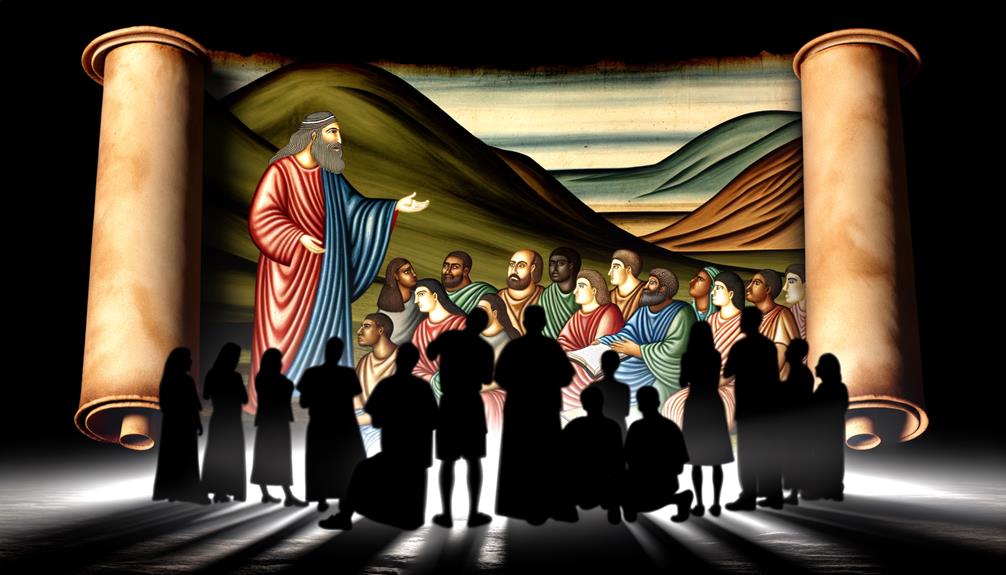Swear Meaning in the Bible: Oaths and Truthfulness
In the Bible, swearing entails both solemn oaths invoking God’s name and using profane language. Historical context reveals that oaths were sacred promises essential to covenant relationships, with severe consequences for breach.
Theologically, God’s name’s sanctity is paramount, and profane language is prohibited as corrupt communication. Jesus’ teachings emphasize straightforward, honest speech, refraining from elaborate oaths.
Biblical narratives underscore the significance of integrity and trustworthiness, condemning false oaths and highlighting divine faithfulness. Modern interpretations vary, balancing scriptural sanctity and contemporary nuances.
Exploring these themes provides a deeper understanding of biblical teachings on swearing.

Swear Meaning in the Bible: Oaths, Promises, and Spiritual Integrity
| Biblical Reference | Meaning | Symbolism | Spiritual Insight |
|---|---|---|---|
| Matthew 5:34-37 | Avoid Swearing Oaths | Let your yes be yes | Emphasizes honesty and integrity in speech |
| Exodus 20:7 | Reverence for God’s Name | Not taking God’s name in vain | Swearing falsely dishonors God |
| Deuteronomy 6:13 | Swearing by God’s Name | Oaths to confirm truth | Swear only by God’s name, with reverence |
| James 5:12 | Prohibition Against Swearing | Avoid casual or false oaths | Uphold truth without the need for oaths |
| Hebrews 6:13-17 | God’s Oath as Assurance | God swore by Himself | God’s oath confirms His unchangeable promise |
Biblical Definition of Swearing

The biblical definition of swearing encompasses both the act of making solemn promises or oaths and the use of profane or blasphemous language, reflecting a multifaceted understanding rooted in historical and theological contexts.
Historically, swearing an oath was a serious act, often invoking God’s name to attest truthfulness or commitment.
Theologically, this practice is intertwined with the sanctity of God’s name, as seen in the Third Commandment, which admonishes against taking the Lord’s name in vain.
Profane language, on the other hand, is seen as corrupt communication that defiles both speaker and listener, violating sacred respect.
Consequently, swearing, in its biblical sense, demands a nuanced approach, recognizing its dual aspects of solemnity and sanctity.
Oaths in the Old Testament

In the Old Scriptures, oaths were profound commitments often invoking the name of God, consequently becoming sacred covenant promises with significant theological and societal implications.
The binding nature of these vows demanded a stringent adherence, with severe repercussions for those who failed to honor them, underscoring the gravity with which these pledges were regarded.
Through historical accounts, we observe the pivotal role oaths played in maintaining moral and social order within the Israelite community.
Sacred Covenant Promises
Throughout the Old Scriptures, sacred covenant promises, often formalized through oaths, serve as foundational elements in the relationship between God and His people. These oaths underscore a profound commitment and divine assurance.
Key examples include:
- Abrahamic Covenant: God’s promise to Abraham, ensuring numerous descendants and a blessed nation (Genesis 12:2-3).
- Mosaic Covenant: The pledge to Moses, establishing laws and commandments for Israel’s guidance (Exodus 19-24).
- Davidic Covenant: God’s vow to David, guaranteeing his lineage would endure forever (2 Samuel 7:12-16).
- New Covenant: Foretold by prophets like Jeremiah, promising a renewed relationship with God’s people (Jeremiah 31:31-34).
These covenantal oaths reveal the depth of divine commitment and the theological framework of biblical history.
Binding Vows Consequences
Examining the consequences of binding vows in the Old Covenant reveals the weight and sanctity attributed to oaths, reflecting their profound impact on both individual and communal life within the biblical narrative. These vows were seen as irrevocable promises before God, with serious ramifications for breaking them.
Notable examples include Jephthah’s vow in Judges 11 and King Saul’s rash oath in 1 Samuel 14, both leading to significant personal and communal consequences. The theological analysis underscores the divine expectation of fidelity and the societal value placed on trustworthiness.
| Biblical Figure | Vow Made | Consequence |
|---|---|---|
| Jephthah | Sacrificing first encounter | Personal loss, communal impact |
| King Saul | Fasting command | Army distress, near execution |
| Hannah | Dedication of Samuel | Fulfillment, divine blessing |
Understanding these consequences underscores the serious nature of vows in the biblical context.
Sworn Covenants and Promises

Sworn covenants and promises in the Bible serve as foundational elements of God’s relationship with humanity, exemplified by pivotal agreements such as the Abrahamic and Davidic covenants.
These covenants, rooted in historical contexts, underscore a divine commitment that is unwavering and fulfilled through subsequent biblical events.
Analyzing these instances reveals a theological framework where divine promises are both legally binding and spiritually significant, illustrating God’s unwavering fidelity to His word.
Biblical Covenant Examples
How did the ancient practice of swearing covenants and promises shape the theological and historical landscape of the Bible?
The enactment of covenants in the Bible formed the bedrock of the relationship between God and His people, illustrating divine commitment and human responsibility.
Key examples include:
- The Abrahamic Covenant: God’s promise to Abraham of descendants and land (Genesis 12:1-3).
- The Mosaic Covenant: Established at Sinai, featuring the Ten Commandments and laws (Exodus 19-24).
- The Davidic Covenant: God’s assurance to David of an everlasting dynasty (2 Samuel 7:12-16).
- The New Covenant: Prophesied by Jeremiah, fulfilled through Jesus, ensuring internalized law and forgiveness (Jeremiah 31:31-34).
These covenants shaped Israel’s national identity and theological understanding.
Divine Promise Fulfillment
The fulfillment of divine promises in the Bible underscores the unwavering faithfulness of God, manifesting through the realization of covenants made with patriarchs, prophets, and ultimately through Jesus Christ.
Historically, God’s promises to Abraham, such as descendants and land (Genesis 12), were actualized through Israel’s formation.
Theologically, the Davidic Covenant (2 Samuel 7) predicted an eternal kingdom through David’s lineage, ultimately fulfilled in Christ.
Prophetic promises, like the new covenant in Jeremiah 31, signify a transformative relationship with God, realized through Jesus’ sacrificial death and resurrection.
These divine fulfillments exemplify God’s reliability and the continuity of His redemptive plan, offering profound insights into the sacred nature of sworn covenants within the biblical narrative.
Jesus’ Teachings on Oaths

In His Sermon on the Mount, Jesus addresses the practice of taking oaths, urging His followers to let their ‘Yes’ be ‘Yes’ and their ‘No’ be ‘No,’ consequently emphasizing the importance of honesty and integrity in speech.
This teaching underscores several key theological and ethical principles:
- Simplicity in Speech: Jesus advocates for straightforward communication, devoid of elaborate oaths.
- Integrity: The emphasis on truthful speech reflects a deeper moral commitment to integrity.
- Divine Witness: Oaths call upon God as a witness, hence misusing them disrespects His sacred name.
- Cultural Context: In a society where oaths were common, Jesus’ directive was radical, challenging societal norms.
Consequently, Jesus presents a paradigm shift, urging adherence to truth without the crutch of oaths.
False Oaths and Their Consequences

Breaking oaths, particularly those sworn falsely, carries profound theological significance and severe consequences, as evidenced throughout biblical scripture.
In Leviticus 19:12, God explicitly commands, ‘Do not swear falsely by my name and so profane the name of your God. I am the Lord.’ This underscores the sacredness of God’s name and the moral imperative to uphold truth.
Historically, false oaths led to communal distrust and divine judgment, as seen in the plight of Ananias and Sapphira in Acts 5:1-11.
Theologically, such actions breach the covenant relationship with God, eroding one’s spiritual integrity.
Consequently, the Bible unequivocally condemns false oaths, emphasizing that they incur divine retribution and disrupt the moral fabric of the community.
The Role of Integrity and Honesty

Understanding the severe consequences of false oaths necessitates a deeper exploration of the biblical principles of integrity and honesty, which are foundational to a faithful covenant relationship with God. The Bible emphasizes these virtues through various teachings and narratives, highlighting their importance in spiritual and communal life.
- Proverbs 12:22 underscores that ‘the Lord detests lying lips, but he delights in people who are trustworthy.’
- Ephesians 4:25 urges believers to ‘put away falsehood’ and ‘speak truthfully.’
- Psalm 15:1-2 describes a person of integrity as one ‘who walks blamelessly and does what is righteous.’
- James 5:12 advises, ‘let your ‘Yes’ be ‘Yes,’ and your ‘No,’ ‘No,’ to avoid condemnation.’
These scriptures collectively underscore the critical role of honesty and integrity in upholding divine relationships and ethical conduct.
Modern Interpretations and Applications

Exploring modern interpretations and applications of biblical teachings on swearing necessitates a thorough examination of how contemporary believers reconcile ancient scriptural mandates with present-day ethical dilemmas and societal norms.
Historical context reveals that biblical injunctions against swearing aimed to uphold honesty and integrity. Today, theological analysis suggests a continued emphasis on truthfulness and respect in communication.
Modern applications may vary; some believers adopt a literal adherence to scriptural prohibitions, avoiding all forms of oath-taking and profanity. Others interpret these teachings more flexibly, focusing on the spirit rather than the letter of the law.
This nuanced approach allows for a dynamic faith practice that respects both the sanctity of scripture and the complexities of modern life.
Conclusion
The biblical perspective on swearing encompasses a rich tapestry of historical, theological, and ethical dimensions. From the solemn oaths of the Old Covenant to Jesus’ teachings on the sanctity of one’s word, the Bible underscores the gravity of spoken commitments.
False oaths invite severe consequences, emphasizing the importance of integrity and honesty. How does one reconcile ancient scriptural mandates with contemporary moral practices?
The enduring principles of truthfulness and faithfulness remain universally relevant.






